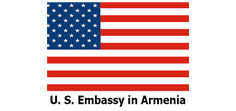Former deputy speaker of the National Assembly and head of the Legal Education and Oversight NGO, which carried out an observation mission in the elections in Artsakh, Arpine Hovhannisyan told Yerkir Media on April 15 that she was concerned about the statements of Georgia, Moldova and Ukraine on the elections in Artsakh.
In particular, the former member of the Republican Party noted: “There is no mention of the Minsk Group in these statements at all. The state should think about this, taking into account the annual, daily, hourly practice of mentioning about warm relations with the leaders of these states.”
Another former Republican MP, Karen Bekaryan, insisted on ArmNews that the Armenian authorities had not taken precautionary measures to avoid an unfavorable international response.
It should be reminded that presidential and parliamentary elections were held in Artsakh on March 31 and a second round of presidential elections on April 14.
International response to 2020 national elections in Artsakh
On April 1, the OSCE Minsk Group Co-Chairs issued a joint statement, noting that they do not recognize the elections. “The Co-Chairs note that Nagorno-Karabakh is not recognized as an independent and sovereign state by any of the Co-Chair countries or any other country. Accordingly, the Co-Chairs do not accept the results of these “elections” as affecting the legal status of Nagorno-Karabakh and stress that the results in no way prejudge the final status of Nagorno-Karabakh or the outcome of the ongoing negotiations to bring a lasting and peaceful settlement to the Nagorno-Karabakh conflict.”
The EU also issued a statement, endorsing and supporting the statement of the Minsk Group.
Georgia and Ukraine have also stated that they do not recognize the elections in Artsakh.
In particular, the Foreign Ministry of Georgia issued a statement reiterating its position of the previous years. “The Ministry of Foreign Affairs of Georgia reaffirms its support for the sovereignty and territorial integrity of the Republic of Azerbaijan and does not recognize the so called presidential and parliamentary elections held on March 31, 2020 in Nagorno Karabakh.”
The statement of the Ministry of Foreign Affairs of Ukraine was also not surprising.
“The Ministry of Foreign Affairs of Ukraine strongly condemns the so-called “presidential and parliamentary elections”, held on March 31 in the territory of Nagorno-Karabakh, the Republic of Azerbaijan. The results of these pseudo-elections have no legal consequences whereas they are contrary to the rules and principles of international law. Ukraine once again expresses its support for the sovereignty and territorial integrity of the Republic of Azerbaijan in its internationally recognized borders and stands for peaceful settlement of the Nagorno-Karabakh conflict” the statement says.
Moldova considered the elections in Artsakh illegal. A statement from the Foreign Ministry of the country said that the presidential and parliamentary elections were in violation of international law and norms enshrined in the Helsinki Final Act and the UN Charter.
The Embassy of Canada in Turkey also issued a condemning statement. “Canada supports the territorial integrity of Azerbaijan and does not recognize the so-called elections held in Nagorno Karabakh on March 31. Such “elections” jeopardize the efforts of the OSCE Minsk Group to reach a peaceful settlement of the Nagorno-Karabakh conflict.”
The Fact Investigation Platform decided to study the reaction of the international community to the elections in Artsakh to find out whether the rhetoric of those organizations or countries has changed. Taking into account the fact that Azerbaijan’s and Turkey’s positions on the conflict are obvious, we have not included the statements of those countries in our study.
Presidential elections in 2012
On July 19, 2012, presidential elections were held in the Republic of Artsakh. International observers from various countries, including Canada, Uruguay and Russia, followed the election.
However, many countries condemned the election, including Russia, Canada, Georgia and others.
EU High Representative for Foreign Affairs and Security Policy Catherine Ashton issued a statement on the eve of the NKR presidential election. In particular, she noted that she does not recognize the constitutional and legal framework within which the elections will be held. “I recall the EU’s firm support to the OSCE Minsk Group, and in particular to the sustained efforts of its Co-chairs, aimed at a peaceful resolution of the conflict. I call on the parties to step up their efforts to find a negotiated solution to the conflict on the basis of the Madrid principles, which would allow progress beyond the status quo. I reiterate the EU’s readiness to provide further support to efforts in this direction.”
The OSCE Minsk Group also stated that it does not recognize the NKR elections. “However, the Co-Chairs note that none of their three countries, nor any other country, recognizes Nagorno Karabakh as an independent and sovereign state. The procedures of July 19 in no way prejudge the final legal status of Nagorno Karabakh or the outcome of the ongoing negotiations to bring a lasting and peaceful settlement to the Nagorno Karabakh conflict.”
Georgia did not recognize the election either. The Ministry of Foreign Affairs of the country issued a statement which said: “The Georgian Foreign Ministry reaffirms its unequivocal support for Azerbaijan’s sovereignty and territorial integrity, and does not recognize the so-called presidential election in Nagorno-Karabakh on July 19.”
Canada, New Zealand and Australia stated that the elections do not contribute to a peaceful settlement of the conflict, as well as expressed their support for negotiations within the framework of the OSCE Minsk Group to reach a peaceful settlement of the conflict.
Parliamentary elections in 2015
On May 3, 2015, elections to the National Assembly of the 6th convocation were held in Artsakh. They were followed by international observers from the United States, the European Union and other countries.
The OSCE Minsk Group Co-Chairs issued a joint statement: “In the context of a comprehensive settlement of the conflict, we recognize the role of the people of Nagorno-Karabakh in deciding their future. However, none of our three countries, nor any other country, recognizes Nagorno-Karabakh as an independent and sovereign state. Accordingly, we do not accept the results of these ‘elections’ as affecting the legal status of Nagorno-Karabakh, and stress that they in no way prejudge the final status of Nagorno-Karabakh or the outcome of the ongoing negotiations to bring a lasting and peaceful settlement to the Nagorno-Karabakh conflict.”
Ukraine, in whose territory the Donbass conflict had started relatively recently, did not recognize the election. “Ukraine does not recognize the so-called parliamentary elections, which took place on May 3, 2015 in Nagorno-Karabakh, and considers them illegal. The results of these ‘elections’ in the occupied territories of Azerbaijan cannot have legal consequences” the Ukrainian Foreign Ministry said in a statement.
The Georgian Foreign Ministry reaffirmed its support for Azerbaijan’s territorial integrity and stated that it does not recognize the parliamentary election in NKR. At the same time, the ministry expressed hope that all the formats will be used for the peaceful settlement of the conflict.
Referendum on constitutional amendments in 2017
In 2017, a referendum on constitutional amendments was held in Artsakh. Eighty-seven percent of voters were in favor of the new constitution. As a result, the system of government in Artsakh shifted from semi-presidential to presidential.
The OSCE Minsk Group Co-Chairs stated that they do not recognize the referendum. “… the Co-Chairs do not accept the results of the referendum on February 20 as affecting the legal status of Nagorno-Karabakh. The Co-Chairs also stress that the results in no way prejudge the final status of Nagorno-Karabakh or the outcome of the ongoing negotiations to bring a lasting and peaceful settlement to the Nagorno-Karabakh conflict.”
Referring to the referendum, Ukrainian Foreign Ministry spokesperson Mariana Betsa said that Ukraine continues to support the territorial integrity of Azerbaijan and does not recognize the referendum.
“Ukraine does not recognize the so-called “constitutional referendum”, which took place on February 20, 2017 on the territory of Nagorno-Karabakh of Azerbaijan Republic, and considers it to be illegitimate. It violates the Constitution of Azerbaijan and international law and has no legal effect. Ukraine’s position on the Nagorno-Karabakh conflict remains unchanged in its unconditional support for the sovereignty and territorial integrity of the Republic of Azerbaijan within its internationally recognized borders” the MFA Spokesperson said.
Georgia did not recognize the referendum either, almost repeating the statement made in previous years.
Thus, summing up the statements of various countries and organizations on the recent national elections in Artsakh, we can state that no changes in positions and rhetoric have been registered. In all elections, the OSCE Minsk Group Co-Chairs have noted that they support democratic processes, but do not recognize the elections since the independence of Artsakh is not recognized. Georgia and Ukraine have unconditionally supported Azerbaijan’s territorial integrity, as they are also involved in similar conflicts. There are almost no changes in their statements either.
Lusine Voskanyan

 FACTOMETER
FACTOMETER










